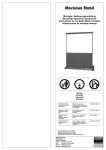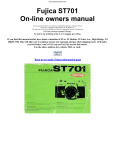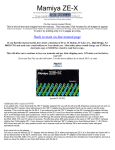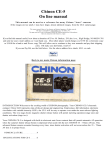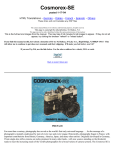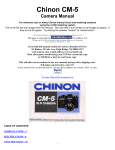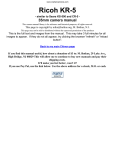Download CHINON ZOOM LENS Specifications
Transcript
Chinon 35-70mm Auto Focus Zoom F3.3-4.5 lens posted 8-12-'03 This is the full text and images from the manual. This may take 3 full minutes for all images to appear. If they do not all appear, try clicking the browser "refresh" or "reload button". This camera manual library is for reference and historical purposes, all rights reserved. This page is copyright by , M. Butkus, N.J. This page may not be sold or distributed without the expressed permission of the producer I have no connection with Chinon Co., Japan If you find this manual useful, how about a donation of $2 to: M. Butkus, 29 Lake Ave., High Bridge, NJ 08829-1701 and send your e-mail address so I can thank you. Most other places would charge you $5.50 for a electronic copy or $10.00 for a hard to read Xerox copy. This will help me to continue to host this site, buy new manuals, and pay their shipping costs. It'll make you feel better, won't it? If you use Pay Pal, use the link below. Use the above address for a check, M.O. or cash. Back to main camera manual page Webmaster: Actually this lens can work on any K-mount camera. It will not lock the shutter if the image is out-of-focus on non-Chinon cameras. Also, since it sends out it's own IR light, it works in very dark setting. Basically this page is almost identical to the 50mm AF lens. On a Chinon CG-5 or CE-5 the contact will work along with the AF lens. Pressing on the shutter button slightly will cause the lens to auto focus, just like the modern cameras today. The CP series will not work correctly. A different lens was to be made and never was released. NOMENCLATURE 1. Diaphragm ring 2. Focus ring indicator 3. Zoom lever 4. Depth of field scale 5. Auto-focus windows 6. Piezo ceramic buzzer 7. Focus ring 8. Bayonet mount 9. Auto-focus contacts to camera body 10. F stop index mark 11. In-focus LED (Green)/Battery check lamp 12. Focusing panel 13. Battery chamber cover 14. Sound signal switch 15. Auto-focus button 16. Power switch INTRODUCTION Welcome to the world of CHINON photography. Chinon has developed a new infrared auto focus system which permits stepless operation even in total darkness. How It Works: An infrared Light Emitting Diode (LED) sends out an infrared beam to the subject. The beam is then reflected back to the cameras internal infrared receiving sensor. The angle at which the infrared reflected beam is received indicates the camera-to-subject distance via triangulation. A micro servo motor positions the receiving sensor which in turn positions the lens in or out to the correct setting. All this technology takes place at lightning speed, so the lens is correctly positioned at the press of a button. Unlike other infrared auto focus systems that select predetermined focus zones, the CHINON AUTO-FOCUS LENS is entirely stepless between 1 m (3.3ft) and infinity (oo). Another key feature of the Chinon Infrared System is a cancelable prefocus lock that allows you to position the focused subject anywhere in the viewfinder. To safeguard the infrared system from ambient infrared sunlight, the infrared beam oscillates at the frequency of 12,500 cycles per second. Your new Chinon 50 mm auto focus lens is perfect when shooting under adverse lighting conditions. With the 50 mm AF you do not have to worry about the often time consuming task of focusing. CARE OF THE AUTO-FOCUS LENS: Your CHINON auto-focus lens is a precision instrument. Used with care, it will provide years of service. Protect your lens from dirt, rain, dampness, and excessive heat. Avoid touching the lens. To clean the lens wipe it gently with a soft lintless cloth or lens tissue. Do not use eyeglass tissues as they might damage the coating. Occasionally clean the autofocus windows with a camel hair brush. When you are storing the lens for a long period of time (more than three months), always be sure to remove the batteries from the battery chamber. NOTE: DO NOT place your 35-70mm AF lens near a strong magnetic filed (i.e. TV, or radio). This might permanently affect the accuracy of the AF system. SPECIFICATIONS: System: Infrared Automatic Focusing System (Capability of Manual Focusing) Auto Focus Indicator: Built-in with red and green LED Auto Focus Audible Signal with On/Off Control: Built-in (piezo ceramic buzzer) Auto Focus Button: Built-in. When depressing Auto Focus Button, automatically set the lens to the focus position and indicate you by the green LED and audible signal. Focus Range: Stepless operation from 1 m (3.3 ft) to no Aperture Range: F/3.3 - F/22 Battery Check: Built-in via GREEN LED Battery: 3 AAA size Alkaline batteries (LR03: 1.5V x 3) operate the auto focus unit Lens: Chinon F/3.3 - 4.5 35-70 mm multi-coated zoom lens Lens Construction: 7 elements in 7 groups Filter Size: 52mm Lens Mount: Chinon Bayonet Mount (K-mount, Pentax K, Ricoh K) Dimensions: 101(W) x 83(H) x 88 (L) mm ( 3.97 x 3.26 x 3.48) Weight: 630 grams (22.22 oz) without batteries INSTALLING THE BATTERIES: Turn the lock at the bottom of the auto focus unit to the "O" position and remove the battery chamber cover (fig. 1). Insert three "AAA" 1.5 V Alkaline batteries (LR03) into the battery chamber. Each battery must be positioned correctly to correspond with the plus (+) and minus (-) signs indicated in the compartment (fig.2). After each battery is positioned, lock the cover by turning to the "C" position. NOTE: Since the batteries rapidly loose power at low temperature, we suggest that you carry a fresh set of batteries. They should be placed inside your coat to be help warm. BATTERY TESTING: The battery condition can be checked by pushing the autofocus button (battery check button) and holding it for 4-5 seconds. The battery check LED (green) on the focusing panel will illuminate if the battery voltage is sufficient (fig.3). NOTE: The battery check LED (green) on the focusing panel will not illuminate if the batteries are installed incorrectly. MOUNTING THE LENS: 1. Remove the rear lens cap from Chinon autofocus lens (fig.4). 2. Remove the lens or body cap from your camera body (fig. 5). 3. Attach the auto-focus lens in the same manner as you would attach any other lens (fig.6). AUTO FOCUSING: Look through the viewfinder and center the subject by utilizing the split image with microprism collar in the viewfinder. Depress the auto-focus button, the focus ring will rotate automatically until the subject is in focus (fig.7). The direction of rotation will be displayed on the focusing panel by a red arrow. When the camera is in focus, the in-focus LED on the top of the auto-focus unit will light up and you will hear a "beep" sound if the sound signal switch is in the "ON" position (fig.8). Once the lens is in focus, the lens will automatically stop and you may remove your finger from the auto-focus button. NOTE: It is recommended when setting the auto-focus mode that apertures between F/4 - 22 are selected. For your convenience these lens opening are engraved in green. When lighting conditions require larger lens openings we suggest checking the focus with the focusing grid in the viewfinder. DO NOT cover the auto-focus windows with your fingers. Otherwise, the lens will not focus properly. MANUAL FOCUS: Your Chinon auto-focus zoom lens can also be operated manually in the normal manner. When the subject is located less than 1 M (3.3 ft.) you have to focus me subject manually. When focusing manually, set the power switch to me "OFF" position. The following subjects should be avoided when using your 50 mm AF lens in the auto focus mode: * Shiny subjects such as water surfaces or exterior of a car. Since the AF system sends out a beam of infrared light, these surfaces will deflect the beam, resulting in improper focus. These subjects can be focused either manually or by ensuring that the shiny reflective surface is directly perpendicular to the infrared beam. You can manually check the auto-focus operation in these situations by viewing the split image range finder. * Subjects through a glass window. In most instances if the 50 mm AF lens is beyond 2 cm from the glass surface, the AF beam will not penetrate and incorrect focusing may result. * Non-reflectable subjects (smoke, fog, etc.) Just as beam of light from a flash light will pass through these subjects, so will the infrared beam of your 50mm AF lens. Should you have to take pictures under the above conditions, you may focus the camera manually or estimate the camera-to-subject distance. AUTO FOCUSING: 1. Set the power switch (on the back lens) to the "ON" position. 2. Look through the viewfinder and center your subject in the split micro prism center spot. Set the aperture in accordance with the information obtained by the camera (fig. 7). 3. Depress the auto-focus button, me focus ring will rotate automatically until me subject is in focus. When used with the Chinon CE-5 or CG-5 35 mm SLR cameras; operate the film advance lever and depress the shutter release button hallway, the focus ring will notate automatically to me correct focusing position (fig. 8). 4. The direction of rotation will be displayed on the focusing panel by a red arrow. When me image is in focus, the in-focus LED on top of the auto-focus unit will light up and you will hear a beep sound if the sound signal is set to me "ON" position. NOTE: When me subject is too close to be auto focused, (when the subject is located less than 1 M (3.3 ft), a continuous audible signal will be emitted, signaling manual focusing is required. FOCUS LOCK: (Non CG or CE-5 cameras) If you should desire to have your subject "off center" in the picture, first center the subject and focus as previously described, then, remove your finger from the auto-focus button. The focus will automatically lock. Next, recompose your picture with the subject in the desired position in the viewfinder and depress the shutter release button (fig.9). (CG-5 or CE-5 models) If you should desire to have your subject "off center" in the picture, first center the subject and focus as previously described, then, without removing your finger from the auto-focus button or the shutter release button, compose your Picture with the subject in the desired position in the viewfinder, and then depress the shutter release button (fig. 9). APERTURE SETTING, EXPECIALLY FOR THE FLASH PHOTOGRAPHY For your 35-70mm auto-focus zoom lens, align the aperture setting to the green F stop index mark when the focal length is set for 35mm. Align the aperture setting to the yellow F stop mark when the focal length is set for 70mm. INFRARED PHOTOGRAPHY: When using infrared film, an extra focusing adjustment must be made manually. After focusing, note the figure that is adjacent to the green indication line on the distance scale (fig 10 ) then' move that figure over to the red infrared mark engraved on the lens. This adjustment is only required for black and white infrared film. When using color infrared film, focus in the normal way. See Fig. 10 above. NOTE: Read the instructions packed with the infrared film for further information. NOTE: All accessories can be used on your 50 mm AF lens, however, the following three accessories are not recommended. 1. Close-up lens 2. Lens hood 3. Extension Tubes NOTE: When the lens must be used with one of the above accessories, focusing must be adjusted manually. NOTE: Filters such as polarizes, starburst or any other type which requires rotation to achieve desired effects, should be adjusted AFTER the AF lens has been focused.









